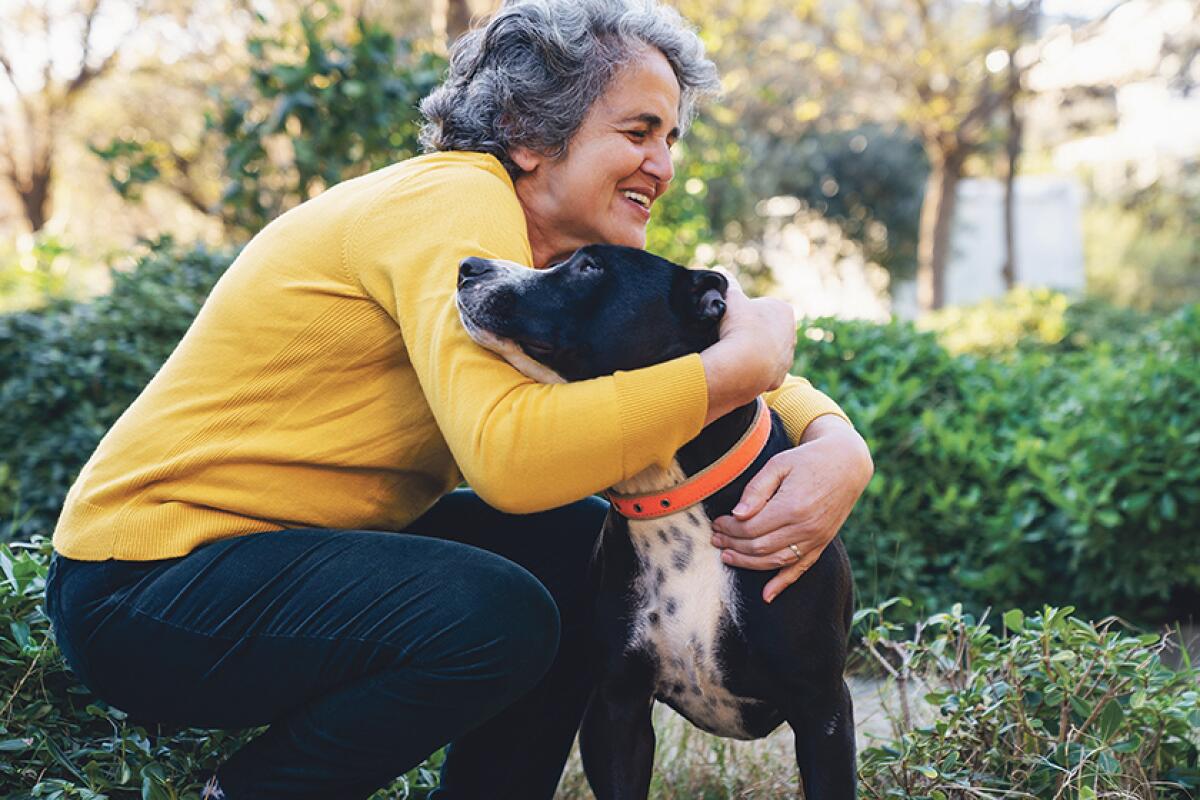Pets Can Help Keep You Well, and You Can Return the Favor

- Share via
One of the routine-shattering events during the COVID-19 pandemic was an unusual clearing of animal shelters. Plenty of people spending a lot of time at home decided it was time to get a pet.
“The pandemic experience was unprecedented,” said Sara S. Strongin, the chief veterinarian and veterinary surgeon for Riverside County Animal Services. “That first year, people came flooding in, looking to adopt dogs and cats. It was unusual - we had a manageable population in the shelter.
“Then in May of last year, it was like flipping a switch, and we were back to pre-pandemic, normal overcrowding with 500 to 600 animals. It felt like it happened overnight.”
Shelters are crowded again. Hundreds of dogs and cats, as well as some horses, chickens, pigs, and rabbits, need new homes. For people who are retired, working from home, or feeling the need for companionship, this is an ideal time to head to your local animal shelter.
Why Get a Pet?
The bond between humans and their pets is a dynamic relationship that benefits the emotional, psychological, and physical health and well-being of both. The companionship, loyalty, and what seems like unconditional love and acceptance offered by dogs earned them the label “man’s best friend.” Writer J.W. Stephens has a widely shared saying: “Be the person your dog thinks you are!” And who doesn’t chuckle at the antics of pets on social media? Pets can be entertaining!
“We know that having a pet can lower your blood pressure and is a great encouragement to exercise,” Strongin said. “Pets can be a cure for loneliness and isolation.
“There’s also satisfaction in knowing you adopted an animal who needed a home. Having a pet can teach kids responsibility. There are many ways pets can improve the quality of life.”
It’s not a one-way street, however. Adopted pets need health care like we do. They need yearly physical exams, bloodwork, vaccinations, deworming, flea and tick control, and sometimes medication. More extensive diagnostics might uncover underlying conditions.
“Find a private-practice veterinarian to provide your pet’s healthcare, and budget for it,” Strongin said. “And your pet will need supplies, like food, dishes, toys, leashes and collars, ID tags, and microchips. And you might want to buy pet insurance right away” for unforeseen medical issues, she said.
In Riverside, “we have a lot of shepherds, huskies, pit bulls and chihuahuas, and most shelter dogs are mixes,” Strongin said. “They come in as strays or are surrendered by their owners. We always try to reunite the animal with the owner, but some are not claimed.”
Are Shelter Animals Healthy?
Generally, yes! Shelter veterinarians provide emergency medical care arriving animals may need, as well as spay and neuter surgeries. But since they have many animals to care for in the shelter, adopters are urged to also have a veterinarian give the pet a thorough exam.
“Shelters are stressful situations, with a lot of noise and different smells,” Strongin said. Animals avoid displaying outward signs of problems. “Cats are particularly good at covering up any ailments, so you don’t see symptoms,” she said. “They can be quite stoic.”
The most stressful thing for a dog, though, is to be adopted, then returned to the shelter a few days or weeks later.
“That can be so frustrating,” Strongin said. “People should do research into the behaviors of various dog breeds before heading for the shelter. Think about your lifestyle and how a dog or cat will fit in. If you work long hours away from home, a large dog with a lot of energy would not be a good fit.
“The most important thing about adopting a pet is to understand it is a commitment for a lifetime, for the long haul,” she said. “Be ready to make that commitment.”
-Catherine Gaugh